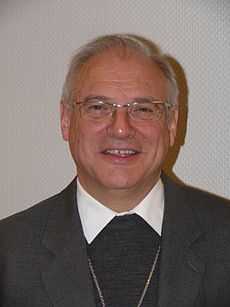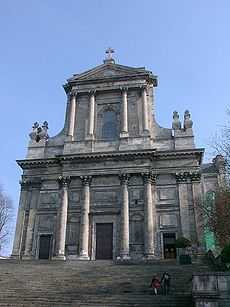Roman Catholic Diocese of Arras
|
| |
| Location | |
| Country | France |
| Ecclesiastical province | Lille |
| Metropolitan | Archdiocese of Lille |
| Statistics | |
| Area | 6,678 km2 (2,578 sq mi) |
| Population - Total - Catholics |
(as of 2012) 1,488,951 1,138,000 (76.4%) |
| Parishes | 832 |
| Information | |
| Denomination | Roman Catholic |
| Rite | Roman Rite |
| Established | 499 |
| Cathedral | Cathedral of Our Lady and St Vedast in Arras |
| Patron saint | Saint Vedast |
| Current leadership | |
| Pope | Francis |
| Bishop | Jean-Paul Jaeger |
| Metropolitan Archbishop | Laurent Ulrich |
| Website | |
| Website of the Diocese | |
The Roman Catholic Diocese of Arras, is a diocese of the Latin Rite of the Roman Catholic church, in France. The episcopal see is the Arras Cathedral, in the city of Arras. The diocese encompasses all of the Department of Pas-de-Calais, in the Region of Nord-Pas-de-Calais. The current bishop is Jean-Paul Jaeger, appointed in 1998.
The most significant jurisdictional changes all occurred during the Napoleonic wars. From 1802 to 1841, the diocese was suffragan of the Archdiocese of Paris, shifting away from the Archdiocese of Cambrai, after Napoleon dissolved the massive Archdiocese. After the defeat of Napoleon, the Napoleonic Concordat united the diocese of Arras, diocese of Saint-Omer and diocese of Boulogne together in one much larger diocese. Unlike most of the other dioceses immediately restored, it was not until 1841 that the diocese returned as a suffragan to the Archdiocese of Cambrai.
History
Saint Martin had evangelized Artois and Arras, capital of the Atrebates Celts by 350AD, however, these early Christian communities did not survive the barbarian invasions at the end of the Roman Empire.[1]
Around 500AD, The Bishop of Reims, Rémi sent Saint Vaast to the region At the beginning of the sixth century St. Remi (Remigius), Archbishop of Reims, placed in the See of Arras St. Vedastus (St. Vaast) (d. c. 540),[1] who had been the teacher of the Merovingian king Clovis after the victory of Tolbiac. His successors, Dominicus and Vedulphus, are also both venerated as saints. After the death of the latter, the See of Arras was transferred to Cambrai, and it was not until 1093 that Arras again became a diocese. By the great reform the bishoprics of the Netherlands in 1559, the diocese had 422 parishes.[1]
Among the bishops of Arras are Cardinal Antoine Perrenot de Granvelle, Councillor of the emperor Charles V, Bishop of Arras from 1545 to 1562, later Archbishop of Mechelen and Viceroy of Naples; François Richardot, a celebrated preacher, Bishop of Arras from 1562 to 1575; Monseigneur Parisis (d. 1866), who figured prominently in the political assemblies of 1848.
Two famous relics were long greatly venerated at Arras: the "sacred manna", said to have fallen from heaven in 371 during a severe famine, and the "holy candle", a wax taper said to have been given to Bishop Lambert in 1105 by the Blessed Virgin, to stop an epidemic. Not far from Arras, the city of Saint-Omer, a diocese till the Revolution, perpetuates the memory of St. Audomare, or Omer, bishop of Thérouanne, the apostle of the Morini in the sixth century. Its cathedral, a Gothic monument of the fourteenth century, was built over the saint's tomb. The ruins of St. Vaast at Arras, and of St. Bertin at Saint-Omer, keep alive the memory of two celebrated abbeys of the same name; the Abbey of St. Bertin (founded in the seventh century) gave twenty-two saints to the Church.
Bishops
1095 to 1300
- Lambert 1095-1115
- Robert I 1115-1131
- Alvise 1131-1148
- Godescalc 1150-1161
- André de Paris 1161-1173
- Robert II 1173-1174
- Fremold 1174-1183
- Pierre I 1184-1203
- Raoul de Neuville 1203-1221
- Ponce 1221-1231
- Asson 1231-1245
- Fursy 1245-1247
- Jacques de Dinant 1248-1259
- Pierre de Noyon 1259-1280
- Guillaume d'Isy 1282-1293
- Jean Lemoine 1293-1294
- Gérard Pigalotti 1296-1316
1300 to 1500
- Bernard 1317-1320
- Pierre de Chappes 1320-1326
- Jean du Plessis-Pasté 1326-1328
- Thierry de Hérisson 1328
- Pierre Roger, 1328–1329, later Pope Clement VI
- André Ghini de Malpighi 1331-1334
- Jean Mandevilain 1334-1339
- Pierre Bertrand 1339-1344
- Aimery de Beaufort 1344-1361
- Gérard de Dainville 1362-1369
- Adhémar Robert 1369-1370
- Étienne I 1370-1371
- Hugues Faidit 1371-1372
- Pierre Masuyer 1372-1391
- Jean Canard 1391 ou 1392-1407
- Martin Poré 1408-1426
- Hugues de Cayeu 1426-1438
- Fortigaire de Plaisance 1438-1452
- Jacques de Portugal 1453
- Denis de Montmorency 1453
- Jean Jouffroy 1453-1462
- Pierre de Ranchicourt 1463-1499
- Jean Gavet 1499-1501
1500 to 1800
- Nicolas Le Ruistre 1501-1509
- François de Melun 1509-1512
- Philippe de Luxembourg 1512-1515
- Pierre Accolti 1515-1523
- Eustache de Croy 1524-1538
- Antoine Perrenot 1538-1559
- François Richardot 1561-1574
- Mathieu Moulart 1575-1600
- Jean du Ploich 1600-1602
- Jean Richardot 1602-1610
- Hermann van Ortemberg 1611-1626
- Paul Boudot 1626-1635
- Nicolas Duffif 1635-1651
- Jean Le Camus 1651-1652
- Étienne Moreau 1656-1670
- Guy de Sève de Rochechouart 1670-1724
- François Baglion de La Salle 1725-1752
- Jean de Bonneguise 1752-1769
- Louis François Marc Hilaire de Conzié 1769-1790

From 1800
- Hugues-Robert-J.-Ch. De La Tour d’Auvergne Lauragais 1802-1851
- Pierre Louis Parisis 1851-1866
- Jean-Baptiste Joseph Lequette 1866-1882
- Guillaume René Meignan 1882-1884, also Archbishop of Tours
- Desiré-Joseph Dennel 1884-1891
- Alfred-Casimir-Alexis Williez 1892-1911
- Émile-Louis Cornil Lobbedey 1911-1916
- Eugène Julien 1917-1930
- Henri-Edouard Dutoit 1930-1945
- Victor-Jean Perrin 1945-1961
- Gérard-Maurice Eugène Huyghe 1961-1984
- Henri-Fr.-M.-P. Derouet 1985-1998
- Jean-Paul Jaeger 1998–present
References
External links
![]() This article incorporates text from a publication now in the public domain: Herbermann, Charles, ed. (1913). Catholic Encyclopedia. Robert Appleton Company.
This article incorporates text from a publication now in the public domain: Herbermann, Charles, ed. (1913). Catholic Encyclopedia. Robert Appleton Company.
